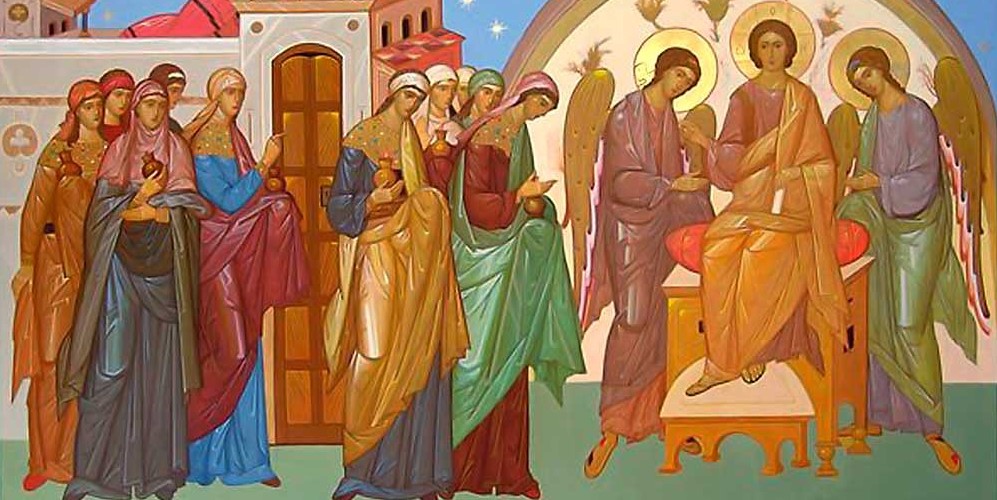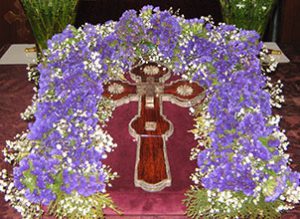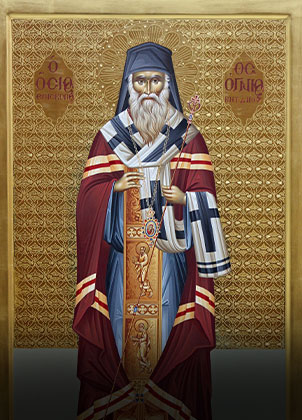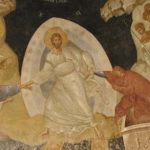Во имя Отца и Сына и Св. Духа.
Братья и сестры,
Сегодня была прочитана притча Господа нашего Иисуса Христа о десяти девах.
«Тогда подобно будет Царство Небесное десяти девам, которые, взяв светильники свои, вышли навстречу жениху. Из них пять было мудрых и пять неразумных. Неразумные, взяв светильники свои, не взяли с собою елея. Мудрые же, вместе со светильниками своими, взяли елей в сосудах своих.» (Мф. 25:1-13)
Все десять названы девами, что показывает, что все они были безупречного поведения, иначе они не удостоились бы наименования дев. По внешнему поведению все они были безупречны. Однако, одни были мудры, а другие неразумны. Мудрые вошли в чертог Жениха, а глупые остались вне его.
Эта притча обращена к христианам. Она показывает, что и из уверовавших во Христа не все спасутся. И у неразумных дев были светильники, но они были пусты. Точнее, немного елея имелось и у них, но недостаточно.
Как истолковать эту притчу?
Пустые светильники неразумных дев – это внешне праведная, благочестивая жизнь. Евангелие предостерегает нас, что внешние формы христианской жизни не спасут нас, если они не наполнены внутренним содержанием.
Внешнюю христианскую жизнь составляют: хранение целомудрия, совершение ежедневных молитв, соблюдение постов, посещение церкви, благотворительность и т.п. Все это необходимо, но это составляет только внешнюю форму христианской жизни. Если эта внешняя форма не наполнится внутренним содержанием, то она будет подобна пустому светильнику, не дающему света.
Елей в сосудах – это то, что хранится в нашем сердце. Наше сердце – это сосуд. Наше сердце должно наполниться елеем духовных добродетелей: любовью, радостью, миром, долготерпением, милосердием, кротостью. (Гал. 5:22-23)
Девы названы неразумными, потому что это, действительно, очень глупо потратить свою жизнь впустую и отойти в вечность без всякого плода. Много потрудившись в земной жизни, они не получили никакой награды и не вошли в чертог небесного Жениха, т.е. в небесное Царство.
Неразумие их в том, что они смогли совершить более трудное дело, но по своей беспечности потеряли все. Потому что то, что составляет «внешнюю деву», требует и труда, и затраты сил и денег. А то, что подразумевается под «елеем», не требует труда.
В самом деле, какой труд в том, чтобы быть снисходительным и ласковым к ближним, а не требовательным, грубым и жестоким? Какой труд в том, чтобы не осуждать и не сплетничать? Какой труд в том, чтобы не завидовать?
В некоторых притчах Господь называет себя Царем или Господином, а здесь называет себя Женихом, показывая, как Он близок к душе ищущей Его. Будем приближаться к Богу усердной и внимательной молитвой. В молитвенном общении с Богом смысл и содержание нашей жизни. Иначе наша жизнь будет проходить впустую, без всякого плода.
Как же достичь того, чтобы наше сердце изменилось? «Человекам это невозможно, Богу же все возможно» (Матф. 19,26). Только Бог силен «отъять сердце каменное от плоти нашей и дать нам сердце плотяное» (Иез. 11,19). т.е. чтобы смягчилось наше сердце, и стало способным любить, сострадать и прощать.
Аминь
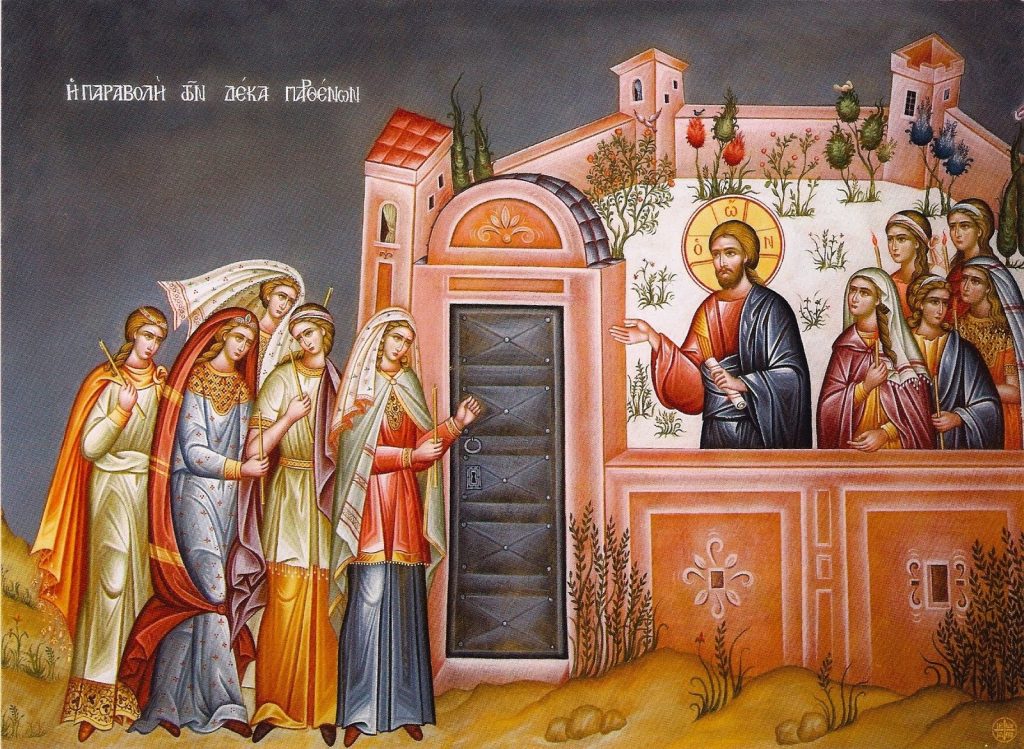
In the name of the Father and of the Son and of the Holy Spirit.
Brothers and sisters,
In today’s Gospel reading we heard the parable of our Lord Jesus Christ about ten virgins.
“Then the kingdom of heaven shall be likened to ten virgins who took their lamps and went out to meet the Bridegroom. Now five of them were wise, and five were foolish. Those who were foolish took their lamps and took no oil with them, but the wise took oil in their vessels with their lamps…” (Mat. 25:1-13).
All ten are called virgins, which proves that all were irreproachable in their behaviour, otherwise they wouldn’t have been worthy to be called virgins. Outwardly, their conduct was faultless. At the same time, some were wise while the others foolish. The wise ones entered the wedding hall of the Bridegroom, while the foolish remained outside.
This parable is addressed to Christians. It reveals that not everyone who believes in Christ will be saved. The five foolish virgins also had lamps, but they were empty. More precisely – they too had some oil, but not sufficient in volume.
How is this parable to be interpreted?
The empty lamps of the foolish virgins signify the outward pious life. The Gospel warns us that the external forms of Christian life will not save us if they aren’t filled with an inner content.
The outward Christian life consists of: preserving chastity, reading of daily prayers, observing Lenten days, attending Church Services, doing acts of charity etc… While these acts are essential, they are only the outward form of Christian living. If this external form is not filled up with supportive inner content, it will be akin to an empty lamp that doesn’t shed any light.
The “oil in the vessels” is that which is stored in our heart. Our heart is the vessel. Our heart must be filled with the oil of spiritual virtues: love, joy, peace, mercifullness, patience, meekness. (Gal. 5, 22-23)
The virgins are called foolish because it is indeed very foolish to waste your whole life in vain and depart into eternity without any fruit. Having laboured much in their lives on earth, they received no reward and didn’t enter the hall of the Heavenly Bridegroom, i.e. the Heavenly Kingdom.
Their foolishness was in that while they were able to accomplish more difficult tasks, their thoughtlessness lost them everything. Because what constitutes an “outward virgin” requires both labour and the expenditure of effort and money. Whereas, there is no need for great labour to realise what “oil” implies.
But in reality, where is the great labour to be compassionate and indulgent to your neighbour and not demanding, rude and cruel? Where is the great labour not to judge and not to gossip? Where is there effort not to be envious?
In some parables the Lord calls himself King or Lord, while here He refers to Himself as the Bridegroom, showing how near He is to the soul that seeks Him. Let us come nearer to God with an intense and persistent prayer; in a prayerful communion with God is the meaning and substance of our lives. Otherwise our lives will go by in emptiness without any fruit-bearing results.
How can we achieve that our hearts would change? “With men this is impossible, but with God all things are possible.” (Mat. 19:26). Only God is powerful enough to: “… take the stony heart out of our flesh, and to give us a heart of flesh.” (Ezek. 11:19) i.e. so that our hearts soften and become able to love, be compassionate and to forgive.
Amen.

